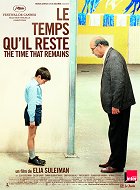Réalisation:
Elia SuleimanScénario:
Elia SuleimanPhotographie:
Marc-André BatigneActeurs·trices:
Ali Suliman, Saleh Bakri, Elia Suleiman, Menashe Noy, Tarik Kopty, Doraid Liddawi, Ehab Assal, Majd Bitar, Ziad Bakri, Alex BakriVOD (1)
Résumés(1)
The Time That Remains est un film en partie autobiographique, construit en quatre épisodes marquants de la vie d'une famille, ma famille, de 1948 au temps récent. Ce film est inspiré des carnets personnels de mon père, et commence lorsque celui-ci était un combattant résistant en 1948, et aussi des lettres de ma mère aux membres de sa famille qui furent forcés de quitter le pays. Mêlant mes souvenirs intimes d'eux et avec eux, le film dresse le portrait de la vie quotidienne de ces palestiniens qui sont restés sur leurs terres natales et ont été étiquetés "Arabes-Israéliens", vivant comme une minorité dans leur propre pays. (Le Pacte)
(plus)Critiques (1)
Two families in one apartment are usually not a good thing. Two nations in one country, with radically opposite ideas about who should govern the country, even about who should live in it and how they should behave - that really smells like trouble. The Time That Remains is an intellectually oriented grotesque about the coexistence of two roosters in one landfill, where one of them clearly dominates and doesn't hesitate to painfully mock the weaker one when necessary, which has unpleasant consequences for the weaker one. It's a typical festival film that has a chance to appeal to alternative audiences who like to experience the unknown. The film is actually an autobiographical chronicle of the lives of two generations of Palestinians in occupied territories from the declaration of the state of Israel to the intifada. Elia Suleiman uses absurd exaggeration, a slightly Kafkaesque style of alienation of a person who has lived in exile for many years and now returns to a country that never belonged to him, and now he doesn't even understand it after years of separation. The first part describing the bitter-sweet overview of the civil war in 1948 was the best for me when the Arabs with an oriental approach to responsibilities couldn't withstand the rationality, organization, and determination of the Israelis. However, gradually the slightly abstract storytelling style started to be a burden to me, so in the end, I settled for a rating of 3 stars and a 65% overall impression.
()

